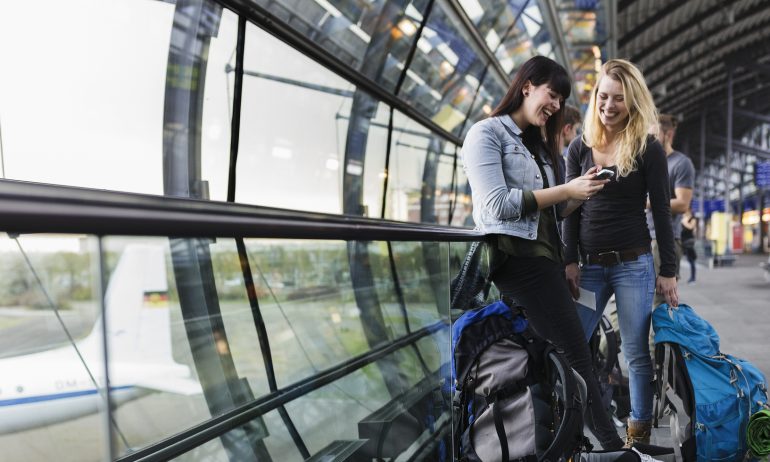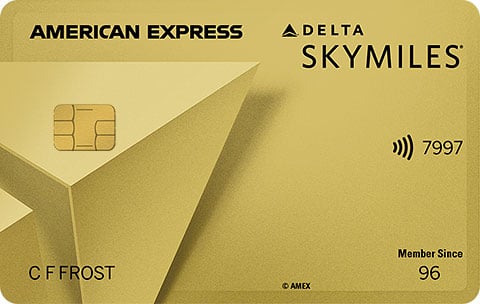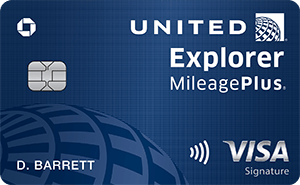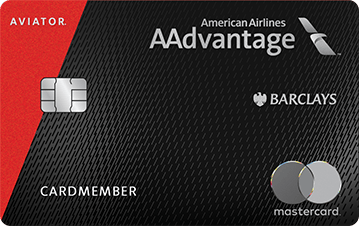Delta vs. United vs. American

Many or all of the products featured here are from our partners who compensate us. This influences which products we write about and where and how the product appears on a page. However, this does not influence our evaluations. Our opinions are our own. Here is a list of our partners and here's how we make money.
Table of Contents
When booking a flight, U.S. travelers can often take their pick from three major legacy airlines: Delta Air Lines, United Airlines and American Airlines. But in the battle among Delta, United and American, which one is best?
To choose a winner, we considered six factors: each airline's routes and destinations, their operational reliability, the extra fees you can expect to pay, how strict each airline's basic economy is, their loyalty programs and their business class products.
Here’s an overview of how the U.S.'s three largest airlines compare.
Routes and destinations
Winner: United
United offers the most international destinations and countries flown to of these three airlines, and it’s practically tied with American for the most destinations overall. But the win goes to United due to its larger partner network, thanks in part to its membership in Star Alliance.
With that said, Delta, United and American each operate flights to hundreds of domestic destinations and international flights to dozens of countries. So the right airline for you will likely depend on your proximity to a hub. Except for the major markets of New York, Los Angeles and Chicago, each airline focuses its hubs in different cities.
Delta
As the old saying goes, "Whether you go to heaven or hell, you have to change planes in Atlanta." Atlanta-based Delta Air Lines operates a network of 307 destinations in 58 countries across six continents as of February 2024.
Delta is a founding member of the SkyTeam alliance — an alliance which includes Aeromexico, Air France, KLM, Korean Air and Virgin Atlantic.
United
Chicago-based United Airlines flies to around 211 U.S. destinations in addition to roughly 138 international destinations across 71 countries covering Europe, Asia, Oceania, India, South America and parts of Africa.
United is a founding member of the Star Alliance, which is currently the world's largest airline alliance boasting 26 members and a network spanning 186 countries.
American
American Airlines bases its operations in Dallas-Fort Worth and flies to 350 destinations across more than 60 countries on five continents. American’s international focus is on flights to the Caribbean, Europe, South America and connecting its Oneworld partners to destinations in Asia and Oceania.
American Airlines is a founding member of the Oneworld alliance. Although the smallest airline alliance at 13 member airlines plus one Oneworld connect partner, Oneworld boasts noteworthy members such as Alaska Airlines, British Airways, Finnair, Japan Airlines, Qantas and Qatar.
» Learn more: Your guide to airline alliances
Reliability
Winner: Delta
Of the three major U.S. airlines, Delta is the clear winner when it comes to recent reliability of operations.
Compared to American and United, Delta had the best on-time percentage, fewest diversions, least mishandled bags and virtually zero involuntary denied boardings across the period of 2023 analyzed by NerdWallet.
Delta
Delta topped all U.S. airlines by operating 80.8% of its flights on-time between January and August 2023, and it involuntarily denied boarding to virtually zero passengers. However, Delta's past operational dominance slipped in other areas.
Delta canceled 1.6% of its flights across the same period, placing it mid-pack among other U.S. airlines. Delta "mishandled" (read: lost, damaged or delayed) around one in 189 checked bags for another mid-tier performance.
Although Delta finished second place overall in NerdWallet’s analysis, these metrics placed Delta far ahead of United and American.
United
United turned in a rather abysmal performance across the 2023 period analyzed by NerdWallet. Despite a solid 75.5% on-time percentage, United canceled 2.28% of its flights.
Only JetBlue Airways (2.59%) and Frontier Airlines (2.87%) canceled a higher percentage of flights. Similarly, United's mishandled baggage rate of 0.84% only barely beat last-place American's 0.85%, and United's flight diversion rate (0.32%) also landed the airline in the second-worst ranking.
Overall, United scored seventh place behind Alaska Airlines, Delta, Southwest Airlines, Allegiant Air, Hawaiian Airlines and American.
American
Although finishing in sixth place just ahead of United, American Airlines arguably turned in a much-better performance. American's 76.44% on-time percentage earned it a bronze medal. Also, American canceled 1.52% of its flights, besting both Delta and United in this field.
However, American Airlines finished in last place when it came to mishandled baggage and second-to-last place for involuntarily denied boarding to passengers.
» Learn more: Avoid airline cancellations: How to book better
Fees
Winner: American
Delta, United and American all have relatively similar fee structures. Each charges $30 for a first checked bag on domestic flights — although advanced purchase is required to get this rate on United. Plus, a full-size carry-on bag and seat selection is complimentary on all main cabin fares.
However, American Airlines edges out Delta and United for the win in this field by charging lower fees for seat selection in NerdWallet’s analysis.
Delta
Checked bag fees: For domestic flights, Delta charges $35 for the first checked bag. Travelers with an eligible credit card, elite status or active military status may be able to avoid this charge.
Seat assignment fees: On basic economy tickets, you'll need to pay a seat assignment fee to avoid getting a randomly assigned seat at check-in. All other fares allow free standard seat selection. However, NerdWallet analysis found you'll need to pay an average of $28.33 to select a main cabin seat near the front of the aircraft.
Change fees: Delta eliminated change fees for most trips originating in the United States, Canada, Europe, Africa and the Caribbean. However, basic economy fares are non-changeable, and Delta will subtract a fee if you cancel a basic economy ticket for a future travel credit.
United
Checked bag fees: United doesn't publish a baggage fee chart. Instead, you need to use United's checked bag calculator to see how much you'll pay. Checked bags for domestic flights currently start at $35 if you prepay or $40 if you pay within 24 hours of departure.
Seat assignment fees: United basic economy passengers need to pay to select or change their seat. All other fare types come with free standard seat selection. However, NerdWallet found that United charges an average of $30 to select a seat near the front of the cabin.
Change fees: On United, you won't pay a fee to change or cancel flights within the U.S., Mexico, the Caribbean or on other international itineraries originating in the U.S. However, basic economy fares cannot be changed without first paying to upgrade your fare.
American
Checked bag fees: American publishes a complicated grid of checked bag fees. You'll pay $35 if you pay online (or $40 at the airport) for a first checked bag on domestic routes — unless you have elite status or an eligible credit card.
Seat assignment fees: All American fares come with free standard seat selection except basic economy. Travelers flying basic economy can pay a fee to select a seat anytime after booking. NerdWallet found the price to select a seat near the front of the cabin averaged $23.
Change fees: American has generally eliminated change fees for all fare types. You can change your flight fee-free as long as your flight starts in the Americas. Like the other airlines, most basic economy tickets are non-changeable — with the exception of flights originating in most European countries, which you can change for a fee.
» Learn more: Airline credit cards that offer free checked bags
Basic economy
Winner: American
When it comes to basic economy fares, American Airlines takes top place for being least punitive. United Airlines doesn't let basic economy passengers bring a full-size carry-on bag onboard. Meanwhile, Delta basic economy fares don't earn any mileage credit.
Add in the fact that American Airlines basic economy fares are upgradeable, and American's policies are comparatively generous.
Delta
Delta basic economy fares are non-changeable, non-upgradeable, non-mileage-earning and you won't get a seat selection until check-in. Can't stand all of those restrictions? NerdWallet found that Delta charges an average of $70 per round-trip to upgrade out of basic economy.
The only bone that Delta throws to passengers is that basic economy tickets can be canceled for a travel credit — less a cancellation fee. Also, Delta basic economy passengers can bring a full-size carry-on bag. That's better than the basic economy fares found at United.
United
Like Delta, United basic economy fares can't be changed, don't come with seat selection and aren't upgradable. But it gets worse. United stands alone among the three airlines in not allowing basic economy passengers to bring a carry-on bag on board — unless you have elite status or a qualifying United credit card.
If you get caught at the gate trying to board with a full-size carry-on bag, you'll need to pay the checked bag fee plus an extra $25.
The only benefit of United basic economy fares is that they're mileage-earning. Plus, United basic economy fares are the cheapest to avoid in the first place. NerdWallet found that the surcharge to upgrade from basic economy to main cabin averages around $49 per round-trip. That's the cheapest markup of any airline we analyzed.
American
Compared to its peers, American Airlines basic economy policies are downright friendly. American Airlines basic economy passengers can bring a full-size carry-on bag on-board, AAdvantage elites are eligible for upgrades and priority boarding and you still earn AAdvantage miles — albeit at a reduced rate.
Basic economy travelers can purchase a seat at any time, and elite status members can still choose seats — even extra-legroom Main Cabin Extra seats — at no charge.
American Airlines even recently removed one of its few restrictions on basic economy fares — domestic basic economy tickets booked directly through the airline can now be canceled for a travel credit, minus a cancellation fee.
» Learn more: Basic economy vs. main cabin: Which is for you?
Loyalty program
Winner: American
American Airlines wins the loyalty program category because of its ultra-valuable elite status program and high return on travel spending. However, Delta takes the prize for the most diverse and rewarding credit card portfolio.
Delta
In NerdWallet analysis, we found that Delta offered the fifth-most-rewarding elite status program when you compare the cost to earn status with the value of that status.
For example, Delta's top-tier Diamond elite status provides around $22,000 in value compared with approximately $34,568 spending requirement to earn that status.
After factoring in Delta's mileage-earning rate, the value of Delta SkyMiles and subtracting non-mileage-earning fees, travelers can expect to get about 5.04% of their spending back in value through Delta SkyMiles. That lands Delta in sixth place overall when it comes to the highest rewards rate, higher than United but below American.
Through its partner American Express, Delta offers seven different credit cards across four tiers of perks, with both consumer and business cards available in all but one tier. Almost all Delta cards offer valuable benefits like a free checked bag and a 15% discount on Delta award redemptions. Terms apply.
United
Overall, United's Premier elite status program tied American for third-most valuable elite status program.
Although United's Premier 1K elite status is the least valuable top-tier elite status of the three airlines, it costs the least to achieve based on NerdWallet analysis and nets an approximate 64% return on the spending required to earn it. In that metric, it's the most rewarding top-tier elite status of the three.
When you factor in United's mileage-earning rate and the value of United miles, United's rewards rate is one of the worst in the industry — only beating Frontier and Spirit Airlines. General MileagePlus members can only expect to get a 4.89% return on spending.
United currently offers six Chase-issued credit cards — four consumer cards plus two business cards. Personal cards range from the no-annual-fee United Gateway℠ Card to the $525 annual fee United Club℠ Infinite Card.
American
At all four tiers, American Airlines AAdvantage elite status is the most valuable in NerdWallet analysis.
Even entry-tier AAdvantage Gold elite status is worth over $2,800. Top-tier AAdvantage Executive Platinum? Worth a whopping $28,894 per year. With that said, each tier of American Airlines elite status is harder to earn than its competitors.
While landing in fourth place overall, the rewards rate that travelers can expect from American Airlines (7.10%) is significantly higher than both Delta (5.04%) and United (4.89%). That's in part due to AAdvantage miles being much more valuable.
American Airlines issues credit cards through both Citi and Barclays, marketing different cards in different channels. Currently, five AAdvantage credit cards are available — four from Citi and the AAdvantage® Aviator® Red World Elite Mastercard® from Barclays.
Business class
Winner: American
Although all three airlines have solid lie-flat business class products, American Airlines' business class is arguably the most consistent — both internationally and on premium domestic routes like New York to Los Angeles.
Meanwhile, Delta still flies out-of-date business class seats on some international routes, and United still operates flights with eight-wide seating in business class on some routes.
Delta
Delta made waves when it introduced its new Delta One suites in 2017. While Delta has installed this excellent business class product on several aircraft, it stopped short of installing it on all of its aircraft.
Plus, Delta is leasing aircraft from its international partners — such as LATAM Airbus A350s — that don't provide as great of an experience. That means you might have an inconsistent experience when flying Delta business class.
United
Likewise, United debuted its new Polaris business class in 2016. A long and slow retrofit process earned United plenty of mockery, but it has finally completed installing Polaris seats on almost all aircraft.
An unofficial tracker shows that United has retrofitted 197 of 201 of its aircraft. As long as you aren't flying to Hawaii, you can be sure that you'll get United's business class product.
American
Once arguably the least-consistent business class product, American Airlines' aircraft retirements during the COVID-19 pandemic were a boon for flyers. American retired its Boeing 757 and 767 aircraft — both of which had sub-par business class products — leaving nothing but solid all-aisle-access business class seats on its international aircraft.
Not to rest on its laurels, American announced a new business class product in 2022 that will debut on its Boeing 787-9 and Airbus A321XLR aircraft in 2024.
Collect airline miles quickly
Airline miles can be redeemed for award flights starting at just 5,000 miles for a one-way ticket, depending on the program. But before you start using miles to book award flights, you have to earn them.
Beyond flying, another way to amass a large number of points and miles is to earn a sign-up bonus from a co-branded airline credit card.
If you seek more flexibility in redeeming miles for award flights, consider applying for a more general travel credit card instead. A more general travel credit card differs from an airline card in that you can book flights with multiple carriers, rather than reaping the benefits of staying loyal to a single brand.
The more high-end the travel credit card, the more benefits you can enjoy, including airport lounge access or automatic elite status in certain programs. That said, a brand-specific airline card can net you benefits like waived baggage fees, which can have meaningful dollar value.
» Learn more: The best airline credit cards right now
Who wins in the battle among Delta, United and American?
Although it might be a surprise to some, the winner is clear. Based on NerdWallet analysis, American Airlines tops Delta and United as the best of the big three U.S. airlines.
American Airlines takes top marks for best loyalty program, least-punitive basic economy, lowest fees and best business class while staying competitive when it comes to number of destinations and operational reliability.
How to maximize your rewards
You want a travel credit card that prioritizes what’s important to you. Here are our picks for the best travel credit cards of 2024, including those best for:
Flexibility, point transfers and a large bonus: Chase Sapphire Preferred® Card
No annual fee: Bank of America® Travel Rewards credit card
Flat-rate travel rewards: Capital One Venture Rewards Credit Card
Bonus travel rewards and high-end perks: Chase Sapphire Reserve®
Luxury perks: The Platinum Card® from American Express
Business travelers: Ink Business Preferred® Credit Card
on Chase's website
1x-5x
Points60,000
Pointson Chase's website
1.5%-6.5%
Cashback$300
2x-5x
Miles75,000
Miles







